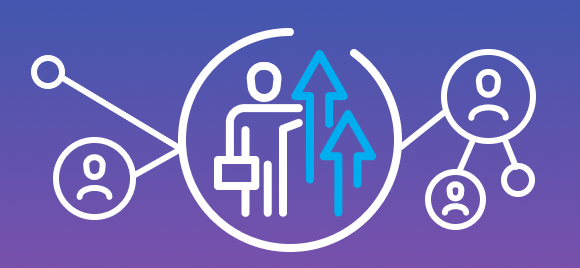Unlock your phone and you likely have access to multiple marketplaces that fulfill nearly any need. Digital marketplaces have massively transformed industries and consumer behavior. Consider how Amazon reshaped retail, Uber transformed transportation, and Airbnb altered temporary vacation lodging, becoming existential threats for their traditional counterparts. For instance, in 2018, U.S consumers spent more money with Airbnb than with giants like Hilton. In fact, Airbnb now owns 20 percent of the U.S consumer lodging market.
Digital marketplaces like these connect thousands of buyers and sellers on a single platform, managing backend processes like logistics and financial transactions. Sellers get to expand their customer base without having to invest in business development, while buyers have access to a greater range of products than ever before.
At the heart of marketplaces’ success is personalization. Online platforms allow buyers to tailor their needs so they can receive personalized recommendations via machine learning algorithms. Thanks to their ability to serve up the right products to their customers, marketplaces were expected to account for 40 percent of the global online retail market by 2020–and that prediction was made prior to COVID-19 forcing millions of people to stay inside and do most of their shopping online.
Online marketplaces have transformed nearly every industry they’ve touched. And now they’re set to transform hiring. In fact, online talent platforms are expected to add $2.7 trillion to global GDP by 2025 and to increase employment by 72 million full-time equivalent positions. Wondering why? Read on to learn more about the incredible potential of hiring marketplaces and why they’re set to play a major role in the future of staffing.
How Hiring Marketplaces Are Transforming Staffing
Digital hiring marketplaces connect candidates with various skill sets and across many geographies with businesses looking to hire both short- and long-term, either directly or through staffing agencies. Many of these marketplaces also leverage the power of modern AI-powered hiring tools that streamline every part of the recruiting process, from sourcing to shortlisting to hiring.
Think about the most important function of a market: it connects buyers and sellers. Hiring marketplaces simplify talent sourcing by unifying the recruiting ecosystem. Currently, traditional recruitment practices are inefficient and fragmented. Employers must comb through too many disjointed sources, including multiple staffing suppliers, social media, job boards, and internal talent pools, to find the right candidates. Hiring marketplaces, however, have the power to bring everyone into a common digital space: businesses, staffing agencies, independent recruiters, and candidates. As a result, businesses can reach a greater network of job-seekers and staffing providers across specializations and geographies, making it easier to quickly fill open positions with the right talent.
But expanding the pool of available candidates alone is not enough. Hiring platforms like Crowdstaffing VMS come with built-in hiring tools that perform functions ranging from applicant screening and onboarding to customizable and automated hiring workflows, cutting down on tech integration nightmares and logistical hassles. Our job matching algorithms, for instance, automatically recommend the most qualified candidates for the job fuels improved hiring outcomes. Businesses are no longer overwhelmed by unqualified applications or even the need to manage multiple staffing vendors, and candidates can expect quicker responses, boosting their overall experience.
Finally, hiring marketplaces create greater accountability and transparency in recruiting. All your hiring data is recorded on the platform, so you can easily track KPIs like time-to-hire, cost-per-hire, total recruiting spend, and staffing vendor performance.
Why Hiring Marketplaces are the Future of Staffing
The global coronavirus pandemic altered the world as we know it. Less than 2 years ago, many of us couldn’t imagine that most of the world would experience shutdowns, that busy city streets would become deserted, and international borders would close. While life as we know it has come to a halt, it’s the virtual world of video calls and online platforms that have largely kept life going.
As we dealt with immediate challenges, businesses everywhere had their employees working from home. While the telecommuting and remote work trend had already been growing, this crisis has forced many companies to explore and implement remote work earlier than planned. And as hiring remotely at scale becomes a priority, organizations turned to the immense potential of platform-based, AI-boosted hiring marketplaces.
As of March 2020, nearly 40 percent of companies globally had begun conducting virtual interviews while hiring, with hiring marketplaces and AI-powered tools receiving more inquiries and increased use by existing customers. Early adopters benefited from hiring platforms and ended up gaining a competitive advantage by saving money on recruiting, attracting, and hiring quality candidates, and freeing up their internal talent acquisition teams for strategic thinking and decision-making.
With COVID-19 accelerating the onset of the Fourth Industrial Revolution, the nature of work and the workforce is going to change rapidly, opening up newly desired skill sets and potentially even new kinds of jobs. This makes it more important than ever for talent acquisition professionals to think and act strategically. To stay ahead of the curve, their teams will have to predict and plan for their organization’s future hiring needs, making time the most important commodity.
Finally, due to the current economic uncertainty, companies are likely to further adopt a contingent workforce. Why? Businesses that find themselves in risky situations or with temporary demand spikes are more likely to hire contingent workers to meet their needs due to the scalability and lowered risk provided by contingent labor versus permanent, full-time employees. Various hiring marketplaces, like the one built into Crowdstaffing VMS, Prosperix’s Vendor Management System, are already positioned to remotely provide contingent hiring at scale.

